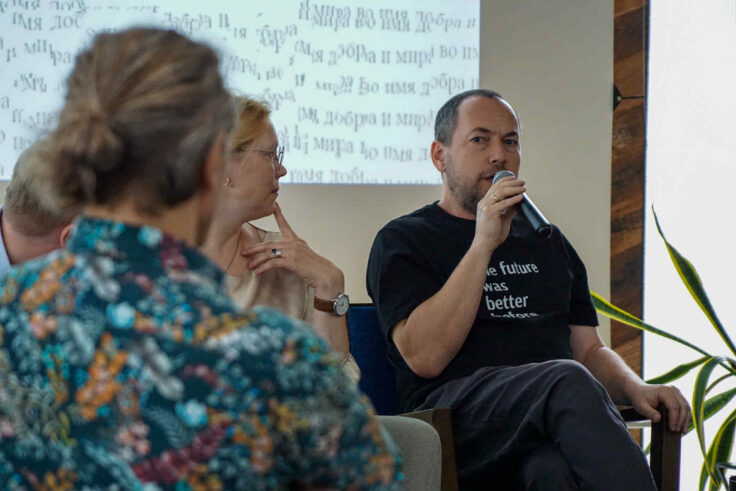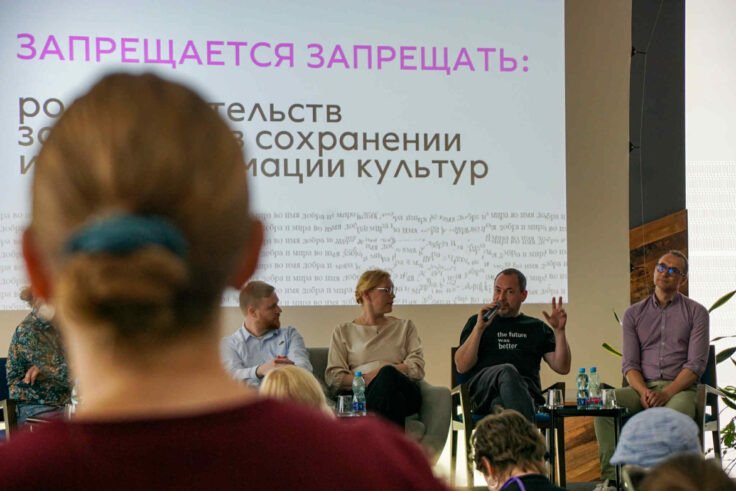
Following the start of the war, dozens of Russian-language small presses sprang up beyond Russia’s borders. Recently, their representatives — Aglaia Asheshova (“Turgenev Library”), Igor Ivanov (Skaryna Press), Yakov Klots (Tamizdat Project), Evgeny Kogan (“Babel Books,” Tel Aviv), Maxim Kurnikov (“Echo Book”), and Alexander Gavrilov (Vidim Books) — gathered for a panel discussion at the “Prague Book Tower” book fair (Sept’25).
Are the cultural developments of the Russian diaspora and those inside Russia truly separate? — This debate has been raging since at least the time of Herzen. In the 1990s, at Moscow’s Gorky Institute of World Literature, in one of the narrow corridors, there were two doors side by side: one labeled “Soviet Period Sector,” the other “Russian Abroad Sector,” — recalls Alexander Gavrilov. — Their staff studied Russian writers working in the same era, in the same language, and for the most part in dialogue with one another. But the researchers deliberately avoided eye contact. It was especially awkward for them to pass each other in the corridor on payday, when everyone lined up in a long queue to the cashier. Then they tried to “walk on tiptoes.”
In today’s world, the idea that external and internal cultural processes can be isolated from each other seems completely absurd. Today’s Russian-language publishers operate in a shared cultural space.
Aglaia Asheshova is the curator of the Russian book collection at the University Library of Languages and Civilizations (BULAC) in Paris, and concurrently the director of the Turgenev Library, which is marking its 150th anniversary this year. After Russia’s invasion of Ukraine began, publishing initiatives mushroomed, from Riga to New York. In 2023, the “Turgenevka” decided to collect books published by the diaspora; a new classification code called “Emigrantica” was created at the library. There are now 150 books in this sector, and rough estimates put the total at 600 to 700. The circulation for most of them is 300–400 copies; if it exceeds a thousand, publishers say, that’s already a major success. In fact, it’s practically impossible to tally the actual number of printed copies today. According to Maxim Kurnikov, an initial print run announced as 500 copies can easily balloon to 2,000 after additional printings in various shops and print-on-demand services.

Nevertheless, according to Aglaia Asheshova, the book market has already taken shape. Demand is clear: for instance, books by Evgenia Berkovich are always in high demand. As for sales, according to Maxim Kurnikov’s data, for the past three or four weeks (in), the biography of Vladimir Putin — The Tsar in His Own Person by Roman Badanin and Mikhail Rubin — topped the charts.
The problem is that the development of the literary criticism field and specialized media lags behind the publishing market. Yakov Klots notes that there are very few book bloggers writing about editions printed abroad, and very few media outlets willing to publish their reviews. In his words, the only serious website covering books published abroad is “Words Beyond Themselves”.
An important task for exile publishers is to spread information about new books not only to readers, but also to scholars and librarians. This outreach mission, however, clashes with security concerns. Publishers conceal the identities of staff who worked on books inside Russia; librarians privy to the identities behind pseudonyms do not consider it ethical to disclose them. This could pose an obstacle for future literary scholars. Moreover, it’s crucial that information about the books be available not only in the original language. “Only then will foreign libraries start acquiring these books, students studying them, and professors teaching them, once the books escape the ghetto,” Yakov Klots believes.
Top news on scientists’ work and experiences during the war, along with videos and infographics — subscribe to the T-invariant Telegram channel to stay updated.
Meanwhile, tamizdat is not just a way to communicate with Russian-speaking audiences and scholars, but also one of the means to inform Western audiences about what’s happening in Russia. Currently, Aglaia Asheshova and her colleagues are preparing an exhibition on censorship at the “Turgenevka.” The organizers have compiled a list of 800 “undesirable” books (out of 140,000 published in Russia) and are now drafting explanatory notes in European languages. In particular, exhibition visitors will be able to compare, using the example of Maria Stepanova’s book Focus, how the text looks when printed from the same layout in a Moscow publishing house versus a European one. This is a way to vividly demonstrate to the Western reader the criteria guiding today’s censors in Russia. “And I’m absolutely certain they’ll be surprised more than once upon reading the commentaries,” says Aglaia Asheshova.
Contemporary tamizdat differs greatly from that of the 1950s. This applies to both the authors and, crucially, the readers. This, in essence, highlights the generational divide within the émigré book world. According to Alexander Gavrilov, today’s situation differs from the Soviet era not only in that publishers like “YMCA-Press,” “Life with God,” and “Ardis” believed their main goal was to smuggle books into the Soviet Union. Modern exile publishers operate — and Russian readers inside the country criticize them for it — within their own émigré bubble. In this sense, contemporary book publishing resembles that of the first wave of emigration in the 1910s–1920s. But the very ability to discuss this topic and maintain ties with readers in Russia signals a new technological, informational, and cultural landscape.

The reason books from émigré publishers remain largely trapped in this bubble and struggle to reach a mass Russian readership is that it’s impossible to import large print runs into Russia and set up distribution through retail chains. If books could enter Russia freely and safely for readers, publishers believe, print runs would of course be much larger and would reach Russian audiences. Currently, the political role once played by the old tamizdat has been taken over by e-books and the internet at large. But digital editions still don’t make up for the demand for print literature. According to Alexander Gavrilov, even in the most advanced market — the U.S. — e-books account for only a 25% of sales, meaning that 75% of books are still sold in print. Therefore, finding ways to get physical books from abroad into the Russian Federation is critically important.
Up-to-date videos on science during wartime, interviews, podcasts, and streams with prominent scientists — subscribe to the T-invariant YouTube channel!
As Maxim Kurnikov sees it, getting books into Russia is only half the battle. Distributing them without drawing the attention of the security services — that’s the main challenge. And he sees journalists and information openness as the primary source of obstacles to book deliveries: “You might call it superstition, but once an article is published detailing how books enter Russia and the FSB (Federal Security Service, Russia’s primary domestic intelligence agency. — T-invariant) lets them pass, a new crackdown on the book market can be expected within two or three months.” According to Maxim Kurnikov, the situation has already worsened over the past two years: “We’ve already exhausted all those methods from the playbook of 1900s and 1920s publishing. I won’t go into details, but remember how the Bolsheviks operated? They first printed runs abroad, like Struve, who smuggled his journal Liberation through Finland. The Finnish border guards turned a blind eye because they, too, sought independence. But the Bolsheviks came up with a clever trick: they set up their underground print shops in Kishinev and Baku. So when they intercepted a run of the newspaper Iskra, everyone assumed it had been smuggled in from abroad. That’s the direction we need to explore and work towards.”
Although distribution through major Russian retail chains is now impossible, sales, according to Maxim Kurnikov, proceed openly, with the authorities “miraculously turning a blind eye.” Direct mail delivery also still functions. “We often criticize people in Russia for not protesting, and so on. Let’s instead acknowledge that Russia is home to remarkably brave people. And they’re still ordering tamizdat books, including from foreign stores,” even though they know owning such a book could get them arrested at any moment. So far, publishers say, there have been no cases of repression for “wrong” books.
However, as Evgeny Kogan notes, there have been known issues at the border with books by two authors: Mikhail Zygar and Alexei Navalny. And although little time has passed since September 1, people have already begun refusing to carry books by “foreign agents” (a legal designation in Russia for those engaged in public activity deemed “foreign-influenced,” now barred from publishing books or articles. — T-invariant). Publishers understand that it would take only three to five cases — jailing a schoolteacher, a doctor, a prominent figure over books — to frighten people and cause orders to plummet. Nevertheless, all books from foreign publishers are still finding their way into Russia for now.

Moreover, compared to European publishing, and especially with Belarusian publishing, in Alexander Gavrilov’s words, “the Russian-language diasporic cultural scene is unusually privileged… When we talk about what print runs we sell abroad, folks publishing books in Europe’s minority languages look at us with awe and disbelief: what do you mean ‘15,000 copies of Evgenia Kostyuchenko sold worldwide’? 15,000? How much did we inflate that number? When we say we can reach audiences inside Russia via the internet, our counterparts from China and Iran stop talking to us, turn on their heels, and walk away muttering, ‘Come back when you have a proper autocracy.’” In this sense, the autonomous Belarusian cultural scene is in a far more precarious position. And yet, intense cultural work is underway there.
Living abroad, according to Igor Ivanov, sharpens the sense of national identity within the Belarusian diaspora: demand is growing for editions in the Belarusian language. This is reflected in the book market: it is far harder for a Russian-language Belarusian publishing house, especially one established after 2020, to publish and sell books abroad. That’s why Skaryna Press in London has focused precisely on Belarusian-language publishing: “if not us, then who.” The number of such publishing houses has grown in recent years: in Poland alone, there are at least four or five commercially oriented projects, including Gutenberg Publisher and “Yanushkevich.” In Igor Ivanov’s opinion, if repressions end, they could continue their business in Belarus. Alongside them, however, are Belarusian publishing houses that predate 2020 and target the indigenous Belarusian population in Poland and Lithuania.
Today’s Belarusian emigration continues to create that cultural product which is impossible to create back home, bringing new ideas to Belarusian-language cultural sphere and reshaping the language. For example, even before 2020, it was impossible in the Republic of Belarus to publish books in the classical Belarusian orthography used before the 1933 reform (a Soviet-era standardization that simplified and Russified Belarusian spelling. — T-invariant). At that point, the cultural process was interrupted by repressions. Amid censorship of queer themes in Belarus, Skaryna Press published an anthology of Belarusian gay literature two years ago.

Unlike in Russia, however, books from émigré publishers have limited penetration into Belarus, since the security services control all electronic communications, and due to repressions, people fear smuggling even innocuous books. In seeking motivation to “work for the drawer,” Igor Ivanov recounts his own experience: “As a teenager, I grew up on literature published by the Belarusian emigration. They printed those books not for money, nor with the expectation that they would reach, then part of the Soviet Union. There was no such possibility. They did it quietly, for the future. During Perestroika and the early years of an independent Belarus, that effort paid off. People like me were shaped by those books and have spent our lives guided by the values found within them.
We’re working for the future too. For instance, we publish books on gendered word forms in the Belarusian language. I have seen how, in the twelve years since we released the first dictionary of feminine word forms in Belarusian, the language has changed. An entire generation of journalists and writers has grown up using that dictionary. That slim, 80-page book helped transform our language. And for those in totalitarian countries today who manage to get their hands on uncensored literature, it is important for them to know that free thought exists.”